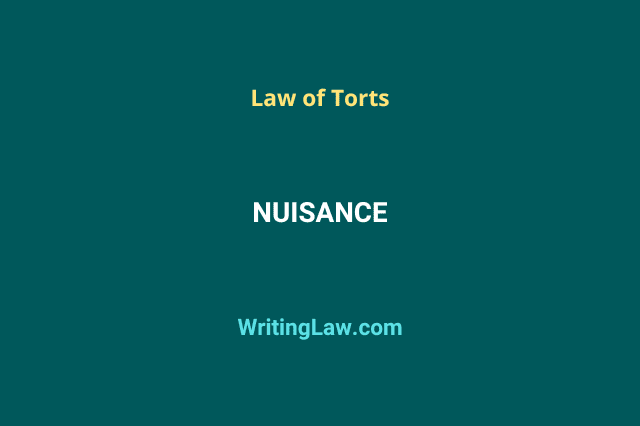
As per the established law of the land, a person who is legally in possession of a property has the right to enjoy that property without any interruption or disturbance. For example, if you have a house or rent one, you have the right to live peacefully in it (and enjoy it). However, if another person’s wrongful use or enjoyment of property causes unlawful interference with such person’s enjoyment or use of that property, the tort of nuisance has occurred.
In simple words, if any person’s wrongful use or enjoyment causes unlawful interference to the actual owner or tenant’s use of that property, then nuisance is said to have occurred. For example, someone next to your house (your neighbour) has set a drain via which dirty water flows into your house. This is an example of a nuisance.
The word nuisance has its source in the French word “nuire” and the Latin word “nocēre,” which means “to do hurt or to annoy.” Therefore, the term nuisance means annoyance, anything which causes hurt, inconvenience or damage or which essentially interferes with the enjoyment of life or property.
Here is an article that talks about the meaning, types and remedies of nuisance under the law of tort.
Definition of Nuisance
Here are some of the definitions given by some famous jurists.
Stephen’s Definition
According to him, nuisance can be defined as anything done or annoyance of the lands, tenements/building (house) or hereditaments (an item of inheritance like property) of another not amounting to trespass.
Salmond’s Definition
Salmond has defined the nuisance as:
The wrong which consists in causing or allowing without lawful justification the escape of any deleterious (harmful) thing from his land or from elsewhere into land in possession of the plaintiff, e.g. water, fumes, smoke, gas, noise, heat, vibration, electricity, disease, germs, animals.
Winfield’s definition
Winfield believed that nuisance cannot be defined. However, for the purpose of the law, he described nuisance as:
Unlawful interference with a person’s use or enjoyment of land or of some right over or in connection with it.
Types of Nuisance
There are two types of nuisance: private nuisance and public nuisance.
A private nuisance is a civil wrong, whereas a public nuisance is a criminal wrong or a crime.
1. Private Nuisance
Private nuisance means interfering with a person’s right to enjoyment and use of his land. It is an injury to a person’s private rights and the prosperous occupation of his property. Basically, private nuisance protects the interest of the particular person with respect to his land or premises in use and its enjoyment.
2. Public Nuisance
A public nuisance is an interference with the right of the public in general and is punishable as an offence. It covers several types of minor crimes that threaten the health, safety, comfort, convenience, welfare, or morals of the community. A public nuisance causes interference to the public at large and not merely to one person.
Public nuisance as an offence has been defined under section 268 of the Indian Penal Code, 1860.
Remedies Available
Remedies for nuisance can be studied under the following three heads:
- Injunction: An injunction is an order which restricts the defendant from doing an act of nuisance, or discontinue plans for threatened nuisance.
- Abatement: Abatement of nuisance refers to the eradication of a nuisance by the party who has been harmed without the need for legal action.
- Damages: Damages may be offered to the aggrieved party in the form of compensation, which could be in the form of nominal damages.
Further, in case of a public nuisance, a fine or sentence may also be imposed in addition to abatement or injunctive relief.
Read Next:
1. Remedies Under Tort Law
2. Introduction, Definition, and Characteristics of Tort
3. All Law Notes Related to the Law of Torts
- Understanding the Legislative Branch of the Indian Government - 6th May 2024
- Appointment, Oath, and Removal of Constitutional Posts in India - 28th April 2024
- Powers of Income Tax Authorities in India - 26th April 2024







